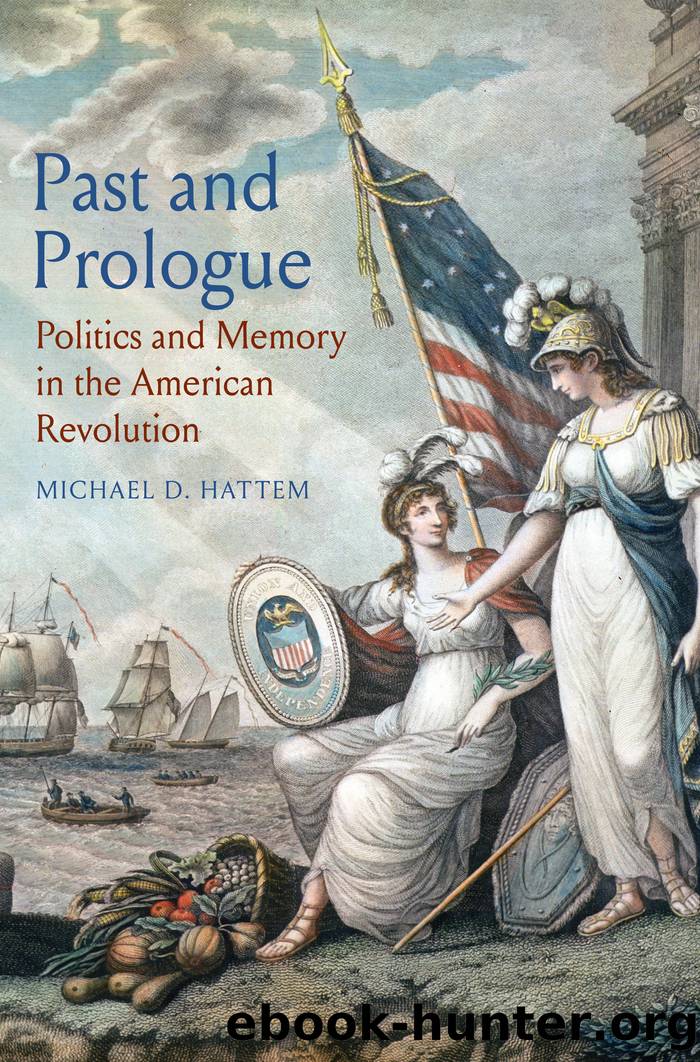Past and Prologue: Politics and Memory in the American Revolution by Michael D. Hattem

Author:Michael D. Hattem [Hattem, Michael D.]
Language: eng
Format: epub
Tags: history, United States, Colonial Period (1600-1775), Europe, Great Britain, Georgian Era (1714-1837), social history
ISBN: 9780300256055
Google: sCQGEAAAQBAJ
Publisher: Yale University Press
Published: 2020-11-24T00:24:31.488523+00:00
To better understand the vast expansion of a national history culture in the early republic, it is necessary to go beyond the texts and circulation of historical cultural productions and look at how they were produced. In the 1780s, an informal network consisting of a web of personal and professional relationships began to emerge that significantly contributed to the growth in historical cultural production and, hence, the expansion of history culture in the early republic. It included historians, antiquarians, essayists, educators, poets, painters, printers/publishers, booksellers, and even a number of elite politicians, the vast majority of whom could be described as cultural nationalists (figure 3). Through their correspondence, travels, and publications, these men and women fed all forms of cultural production and spanned most regions of the new nation. These individuals produced a significant proportion of historical cultural production in the period, while a number of them went on to help establish the nationâs first historical societies. Ultimately, the network played a critical role in the expansion and institutionalization of history culture after the Revolution.
The historians David Ramsay, Jeremy Belknap, William Gordon, Mercy Otis Warren, Ezra Stiles, and even the British historian Catherine Macaulay corresponded with one another and with antiquarians interested in collecting and preserving primary sources from the colonial past, such as Ebenezer Hazard, John Eliot, and John Pintard, among many others throughout the colonies. The network included poets and essayists, such as Benjamin Rush, Joel Barlow, and Timothy Dwight. It included men devoted to producing pedagogical works of nationalist value, for example, Noah Webster and Jedidiah Morse, as well as the painters John Trumbull and Charles Willson Peale. Also keyed into the network were a number of politiciansâGeorge Washington, John Adams, Thomas Jefferson, John Jay, and William Livingston, among many othersâwho corresponded with historians and antiquarians offering support and encouragement for their endeavors, as well as access to official and personal documents. Finally, the network included printers, publishers, and booksellers, who were integral to the process of disseminating the labors of the networkâs participants, such as Mathew Carey and Robert Aitken in Philadelphia, Isaiah Thomas in Boston, Noah Webster in Connecticut (and New York), and Mason Weems, who traveled throughout the country selling books for Carey before becoming a popular biographer.
Download
This site does not store any files on its server. We only index and link to content provided by other sites. Please contact the content providers to delete copyright contents if any and email us, we'll remove relevant links or contents immediately.
| Africa | Americas |
| Arctic & Antarctica | Asia |
| Australia & Oceania | Europe |
| Middle East | Russia |
| United States | World |
| Ancient Civilizations | Military |
| Historical Study & Educational Resources |
Machine Learning at Scale with H2O by Gregory Keys | David Whiting(4292)
Never by Ken Follett(3937)
Fairy Tale by Stephen King(3370)
Oathbringer (The Stormlight Archive, Book 3) by Brandon Sanderson(3154)
The Man Who Died Twice by Richard Osman(3072)
Will by Will Smith(2907)
Rationality by Steven Pinker(2352)
Can't Hurt Me: Master Your Mind and Defy the Odds - Clean Edition by David Goggins(2323)
The Dark Hours by Michael Connelly(2300)
Friends, Lovers, and the Big Terrible Thing by Matthew Perry(2219)
The Dawn of Everything: A New History of Humanity by David Graeber & David Wengrow(2194)
Principles for Dealing With the Changing World Order: Why Nations Succeed and Fail by Ray Dalio(2036)
A Short History of War by Jeremy Black(1842)
HBR's 10 Must Reads 2022 by Harvard Business Review(1839)
Go Tell the Bees That I Am Gone by Diana Gabaldon(1751)
A Game of Thrones (The Illustrated Edition) by George R. R. Martin(1721)
Kingdom of Ash by Maas Sarah J(1667)
515945210 by Unknown(1660)
443319537 by Unknown(1545)
